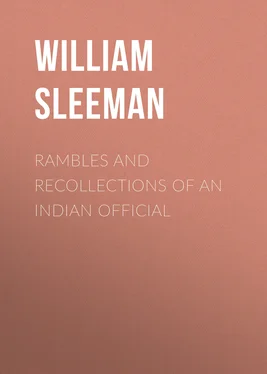William Sleeman - Rambles and Recollections of an Indian Official
Здесь есть возможность читать онлайн «William Sleeman - Rambles and Recollections of an Indian Official» — ознакомительный отрывок электронной книги совершенно бесплатно, а после прочтения отрывка купить полную версию. В некоторых случаях можно слушать аудио, скачать через торрент в формате fb2 и присутствует краткое содержание. Жанр: Путешествия и география, История, foreign_edu, foreign_antique, foreign_prose, на английском языке. Описание произведения, (предисловие) а так же отзывы посетителей доступны на портале библиотеки ЛибКат.
- Название:Rambles and Recollections of an Indian Official
- Автор:
- Жанр:
- Год:неизвестен
- ISBN:нет данных
- Рейтинг книги:4 / 5. Голосов: 1
-
Избранное:Добавить в избранное
- Отзывы:
-
Ваша оценка:
- 80
- 1
- 2
- 3
- 4
- 5
Rambles and Recollections of an Indian Official: краткое содержание, описание и аннотация
Предлагаем к чтению аннотацию, описание, краткое содержание или предисловие (зависит от того, что написал сам автор книги «Rambles and Recollections of an Indian Official»). Если вы не нашли необходимую информацию о книге — напишите в комментариях, мы постараемся отыскать её.
Rambles and Recollections of an Indian Official — читать онлайн ознакомительный отрывок
Ниже представлен текст книги, разбитый по страницам. Система сохранения места последней прочитанной страницы, позволяет с удобством читать онлайн бесплатно книгу «Rambles and Recollections of an Indian Official», без необходимости каждый раз заново искать на чём Вы остановились. Поставьте закладку, и сможете в любой момент перейти на страницу, на которой закончили чтение.
Интервал:
Закладка:
We halted at Tehrī on the 9th, and about eleven o'clock the Rājā came to pay his visit of congratulation, with a magnificent cortège of elephants, camels, and horses, all mounted and splendidly caparisoned, and the noise of his band was deafening. I had had both my tents pitched, and one of them handsomely fitted up, as it always is, for occasions of ceremony like the present. He came to within twenty paces of the door on his elephant, and from its back, as it sat down, he entered his splendid litter, without alighting on the ground. 274In this vehicle he was brought to my tent door, where I received him, and, after the usual embraces, conducted him up through two rows of chairs, placed for his followers of distinction and my own, who are always anxious to assist in ceremonies like these.
At the head of this lane we sat upon chairs placed across, and facing down the middle of the two rows; and we conversed upon all the subjects usually introduced on such occasions, but more especially upon the august ceremonies of the marriage of the Salagrām with the Tulasī, in which his highness had been so piously engaged at Ludhaura. 275After he had sat with me an hour and a half he took his leave, and I conducted him to the door, whence he was carried to his elephant in his litter, from which he mounted without touching the ground.
This litter is called a 'nālkī'. It is one of the three great insignia which the Mogul Emperors of Delhi conferred upon independent princes of the first class, and could never be used by any person upon whom, or upon whose ancestors, they had not been so conferred. These were the nālkī, the order of the Fish, and the fan of the peacock's feathers. These insignia could be used only by the prince who inherited the sovereignty of the one on whom they had been originally conferred. The order of the Fish, or Mahī Marātib, was first instituted by Khusrū Parvīz, King of Persia, and grandson of the celebrated Naushīrvān the Just. Having been deposed by his general, Bahrām, Khusrū fled for protection to the Greek emperor, Maurice, whose daughter, Shīrīn, he married, and he was sent back to Persia, with an army under the command of Narses, who placed him on the throne of his ancestors in the year A.D. 591. 276He ascertained from his astrologer, Araz Khushasp, that when he ascended the throne the moon was in the constellation of the Fish, and he gave orders to have two balls made of polished steel, which were to be called Kaukabas (planets), 277and mounted on long poles. These two planets, with large fish made of gold, upon a third pole in the centre, were ordered to be carried in all regal processions immediately after the king, and before the prime minister, whose cortège always followed immediately after that of the king. The two kaūkabas are now generally made of copper, and plated, and in the shape of a jar, instead of quite round as at first; but the fish is still made of gold. Two planets are always considered necessary to one fish, and they are still carried in all processions between the prince and his prime minister.
The court of this prince Khusrū Pārvīz was celebrated throughout the East for its splendour and magnificence; and the chaste love of the poet Farhad for his beautiful queen Shīrīn is the theme of almost as many poems in the East as that of Petrarch's for Laura is in the West. Nūh Samānī, who ascended the throne of Persia after the Sassanians, 278ascertained that the moon was in the sign Leo at the time of his accession, and ordered that the gold head of a lion should thenceforward accompany the fishes, and the two balls, in all royal processions. The Persian order of knighthood is, therefore, that of the Fish, the Moon, and the Lion, and not the Lion and Sun, as generally supposed. The emperors of the house of Taimūr in Hindustan assumed the right of conferring the order upon all whom they pleased, and they conferred it upon the great territorial sovereigns of the country without distinction as to religion. He only who inherits the sovereignty can wear the order, and I believe no prince would venture to wear or carry the order who was not generally reputed to have received the investiture from one of the emperors of Delhi. 279
As I could not wait another day, it was determined that I should return his visit in the afternoon; and about four o'clock we set out upon our elephant—Lieutenant Thomas, Sarīmant, and myself, attended by all my troopers and those of Sarīmant. We had our silver-stick men with us; but still all made a sorry figure compared with the splendid cortège of the Rājā. We dismounted at the foot of the stairs leading to the Rājā's hall of audience, and were there met by his two chief officers of state, who conducted us to the entrance of the hall, when we were received by the Rājā himself, who led us up through two rows of chairs laid out exactly as mine had been in the morning. In front were assembled a party of native comedians, who exhibited a few scenes of the insolence of office in the attendants of great men, and the obtrusive importunity of place- seekers, in a manner that pleased us much more than a dance would have done. Conversation was kept up very well, and the visit passed off without any feeling of ennui, or anything whatever to recollect with regret. The ladies looked at us from their apartments through gratings, and without our being able to see them very distinctly. We were anxious to see the tombs of the late Rājā, the elder brother of the present, who lately died, and that of his son, which are in progress in a very fine garden outside the city walls, and, in consequence, we did not sit above half an hour. The Rājā conducted us to the head of the stairs, and the same two officers attended us to the bottom, and mounted their horses, and attended us to the tombs.
After the dust of the town raised by the immense crowd that attended us, and the ceremonies of the day, a walk in this beautiful garden was very agreeable, and I prolonged it till dark. The Rājā had given orders to have all the cisterns filled during our stay, under the impression that we should wish to see the garden; and, as soon as we entered, the jets d'eau poured into the air their little floods from a hundred mouths. Our old cicerone told us that, if we would take the old capital of Orchhā in our way, we might there see the thing in perfection, and amidst the deluges of the rains of Sāwān and Bhādon (July and August) see the lightning and hear the thunder. The Rājās of this, the oldest principality in Bundēlkhand, were all formerly buried or burned at the old capital of Orchhā, even after they had changed their residence to Tehrī. These tombs over the ashes of the Rājā, his wife, and son, are the first that have been built at Tehrī, where their posterity are all to repose in future.
CHAPTER 23
The present Rājā, Mathurā Dās, succeeded his brother Bikramājīt, who died in 1834. He had made over the government to his only son, Rājā Bahādur, whom he almost adored; but, the young man dying some years before him, the father resumed the reins of government, and held them till his death. He was a man of considerable capacity, but of a harsh and unscrupulous character. His son resembled him; but the present Rājā is a man of mild temper and disposition, though of weak intellect. The fate of the last three prime ministers will show the character of the Rājā and his son, and the nature of their rule.
The minister at the time the old man made over the reins of government to his son was Khānjū Purōhit. 280Wishing to get rid of him a few years after, this son, Rājā Bahādur, employed Muhram Singh, one of his feudal Rājpūt barons, to assassinate him. As a reward for this service he received the seals of office; and the Rājā confiscated all the property of the deceased, amounting to four lakhs of rupees 281and resumed the whole of the estates held by the family.
Читать дальшеИнтервал:
Закладка:
Похожие книги на «Rambles and Recollections of an Indian Official»
Представляем Вашему вниманию похожие книги на «Rambles and Recollections of an Indian Official» списком для выбора. Мы отобрали схожую по названию и смыслу литературу в надежде предоставить читателям больше вариантов отыскать новые, интересные, ещё непрочитанные произведения.
Обсуждение, отзывы о книге «Rambles and Recollections of an Indian Official» и просто собственные мнения читателей. Оставьте ваши комментарии, напишите, что Вы думаете о произведении, его смысле или главных героях. Укажите что конкретно понравилось, а что нет, и почему Вы так считаете.












